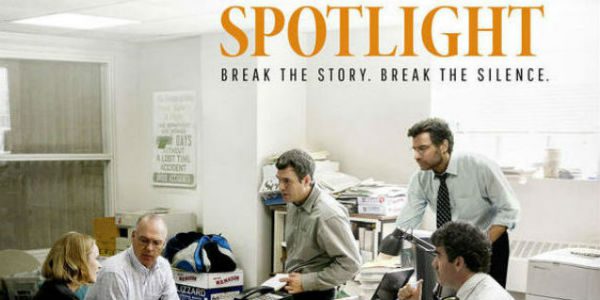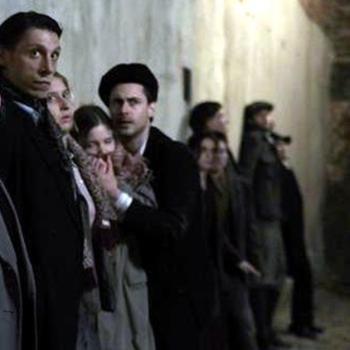 Let’s be honest: a lot of Catholics would have heaved a sigh of relief if “Spotlight” — the searing drama about The Boston Globe’s investigation into the priest sex-abuse scandal in Boston, published in early 2002 — had not won Best Picture on Sunday night.
Let’s be honest: a lot of Catholics would have heaved a sigh of relief if “Spotlight” — the searing drama about The Boston Globe’s investigation into the priest sex-abuse scandal in Boston, published in early 2002 — had not won Best Picture on Sunday night.
Since the movie came out last November, and even before, Catholics braced for the ugly press that would inevitably follow the rehashing of this watershed moment in Church history. Yeah, we’ve come a very long way since 2002 in dealing with the issue externally and internally. Yeah, we’re not the only place, or even the current place, where child sex abuse is prevalent (public schools, prestigious private schools, youth sports teams, Penn State, scouting, Hollywood itself, etc., all have serious issues), but no one wants to hear about that.
The inescapable fact is: We’re Christ’s Pilgrim Church on Earth, and our priests molested children and teens.
The details of how we’ve dealt with this are important to us, but to the news media and the entertainment industry, it’s not a sexy or dramatic story.
The numbers of reported cases have precipitously declined since the scandals broke (almost all of the cases discussed during the height of the scandals were already decades old — and, obviously, one is too many), but it happened.
No one knows better than us the price we’ve paid, and continue to pay, for what was done, and for the devastating way it was (or wasn’t) handled. And while the Church is riding high on the popularity of Pope Francis, “Spotlight” served as a humbling reminder of our fallen nature.
One might be tempted to think that rampant anti-Catholicism was behind “Spotlight” taking home its Oscar, especially since star Mark Ruffalo, writer Josh Singer and director Tom McCarthy joined a 20-person rally for victims of priest sex-abuse outside the Cathedral of Our Lady of the Angels in downtown Los Angeles the afternoon of the awards.
And then there was this this parting shot by producer Michael Sugar during his acceptance speech at the Feb. 28 ceremony:
“Pope Francis, it is time to protect the children and restore the faith.”
Sugar may not know, nor care, that the Church has been doing all of this for quite some time now, and that Pope Emeritus Benedict XVI deserves a lot of the credit for the accountability and reform effort (outlined in some detail on Monday by Joan Desmond in this piece for the National Catholic Register).
Also, “Spotlight” was made by imperfect human beings and may have not been entirely fair to one man depicted in the film, who’s claimed he never said words that were put into his mouth.
But it’s worth noting, as this article from Crux does, that the Vatican doesn’t consider the film to be anti-Catholic:
The Rev. Hans Zollner, a member of the pope’s special commission on sexual abuse and president of the Center for the Protection of Minors at Gregorian University in Rome, told Vatican Radio there is “great appreciation for the movie” among his fellow clerics who have recommended it to each other.
“These bishops recommended their brothers to see the movie, so it’s a strong invitation to reflect and to take seriously the central message, namely, that the Catholic Church can and must be transparent, fair, and committed to the fight against abuse and so that this never happens again,” he said.
…
L’Osservatore Romano, the Vatican’s newspaper, ran two articles on the Academy Awards. In its list of winners, the paper said “Spotlight” is not “anti-Catholic,” but rather, a movie that “has the courage to denounce cases which must be condemned without hesitation.”
Setting all that aside, here are some showbiz things to know about why “Spotlight” won, and the reasons have more to do with the voters and how they voted than a Tinseltown conspiracy to throw more mud on the Church.
Here’s one explanation from The Hollywood Reporter:
Spotlight was a beneficiary of the preferential ballot employed by the Academy and only one other major awards group, the Producers Guild of America. This system is intended to produce a winner that everyone at least likes — a film that might appear at No. 2 or 3 on most ballots — as opposed to one that the largest fraction of people loved but most others did not, like DGA Award winner The Revenant.
The PGA’s employment of this system produced a PGA Award win for The Big Short, which, for a time, put that dramedy in the pole position for the Oscar in the view of most pundits. But there was a difference that many of us failed to account for: The PGA is comprised of producers, whereas the largest branch of the Academy is comprised of actors, whose clear preference was Spotlight, as evidenced by the SAG Awards. Pundits should be forgiven, though: On the four other occasions in which the top three guilds each picked a different winner, the best picture Oscar twice went to the PGA’s pick and twice to the DGA’s pick, but never to SAG’s pick — until Sunday.
“Spotlight” had some other things going for it. It’s an ensemble cast; it employed people who were more working actors than big movie stars; and it was dialogue-heavy, as opposed to action-heavy. All of these things appeal to other actors, who make up the largest voting bloc in the Motion Picture Academy.
Critics might have preferred outdoor action drama “The Revenant” and its big star turn for Leonardo DiCaprio (who finally took home his long-awaited Best Actor Oscar), but it evidently didn’t appeal as much to actors.
The IndieWire blog also made a good point:
Oscar voters also often like a subject that makes them feel good for voting about it, and “Spotlight” tackles an important one. Whereas “Room” might have felt too bleak for some voters, for instance, McCarthy’s film has the right amount of uplift at the end, showing a shocking conspiracy but ultimately seeing it bested, and demonstrating the change that came from it.
Like “Schindler’s List” or “12 Years A Slave,” which also grapple with difficult subject matter, they’re also stories of hope amidst inhumanity, and that plays well with voters. And thus, the quiet triumph of “Spotlight” resonated more than the revenge driven narrative of “The Revenant” (however much its filmmakers talk about climate change and highlighting indigenous peoples, they felt attached to the story rather than inherently part of it), or the more ambivalent conclusion of “The Big Short,” which ends with the corrupt institution essentially prevailing, and our “heroes” getting very rich off the misery of others.
The Los Angeles Times’ Kenneth Turan, in his Oscar rundown, shared an enlightening email exchange:
Moments after Morgan Freeman announced “Spotlight’s” win, an academy member friend who shared my belief in the film sent me the following brief email:
“We were right about ‘Spotlight.’
“Emotion usually wins best pic.”
On this Super Tuesday presidential primary day, it’s useful to remember something that political pundits and operatives often forget: They don’t determine the winner; the voters do.
And on Sunday, the Oscar voters spoke.
Image: Courtesy Open Road Films
Don’t miss a thing: head over to my other homes at CatholicVote and the Faith & Family Media blog, and like my Facebook page; also like the Patheos Catholic FB page to see what my colleagues have to say.

















